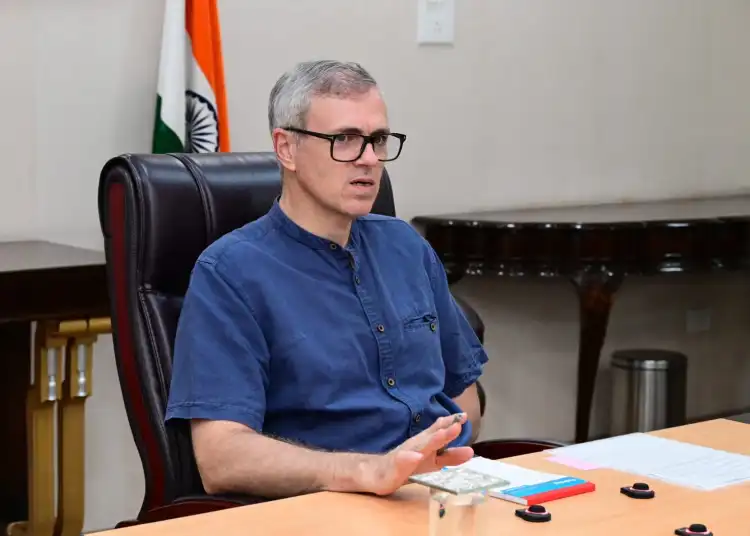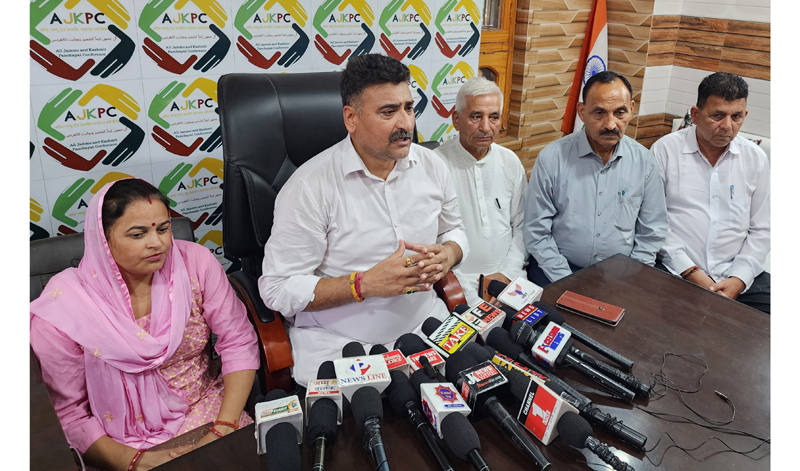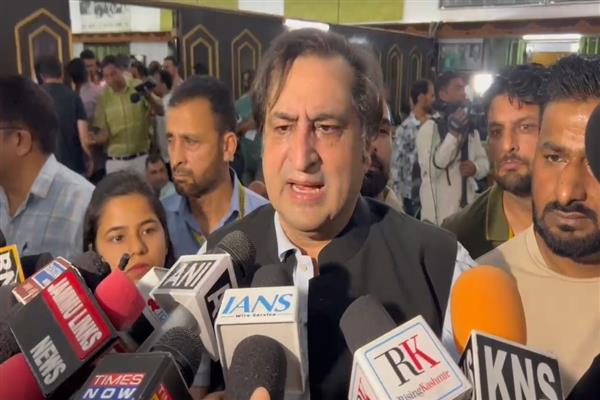As political opposition softens and public focus shifts, Omar Abdullah’s administration may finally find space to recalibrate its governance narrative.
By: Javid Amin | 15 October 2025
A Breathing Space in a Crowded Political Calendar
As Omar Abdullah completes one year in office as Chief Minister of Jammu & Kashmir, the political temperature in the Union Territory appears to be entering a subtle but meaningful shift.
The National Conference (NC)—which rode to power in 2024 on promises of “Dignity, Identity, and Development”—has faced an unrelenting wave of criticism over its inability to deliver on core manifesto commitments such as statehood restoration, employment generation, and constitutional safeguards.
But beyond the noise, recent developments suggest that Omar’s government may be stepping into a less volatile phase, potentially giving it the space to stabilize its coalition, reset its messaging, and push long-pending reforms.
Coalition Politics: Congress Rift May Soften Legislative Gridlock
The most significant opening comes from within Omar’s own coalition. Over the past few months, the relationship between NC and the Indian National Congress has frayed, particularly over the Rajya Sabha seat-sharing dispute.
When NC declined to offer Congress a “safe seat,” tensions flared, and Sajad Lone of the Jammu and Kashmir Peoples Conference even accused Omar Abdullah of bowing to pressure from the BJP.
Yet despite the rhetoric, Congress has not withdrawn its support from the coalition, signaling a possible political détente.
What This Could Mean for Governance:
-
Smooth Passage of Key Bills: Stalled legislation on education reform, transport modernization, and relief schemes could see movement.
-
Improved Legislative Coordination: A quieter alliance floor may reduce confrontations and walkouts.
-
Strategic Re-engagement with Civil Society: NC may use this breathing room to reconnect with tourism stakeholders, business leaders, and youth organizations.
“If NC and Congress manage their differences pragmatically, the government could stabilize its legislative agenda for the next six months,” notes a senior political analyst in Srinagar.
Opposition Fatigue: BJP & Others Focus Elsewhere
The timing of this shift couldn’t be more advantageous for the ruling NC. The Bharatiya Janata Party (BJP) is preoccupied with its by-election campaigns in Budgam and Nagrota, following its early announcement of candidates Aga Syed Mohsin and Devyani Rana.
With Indian National Congress recalibrating its national strategy after the Rajya Sabha fallout and regional parties lacking a united front, the NC may face a relatively less aggressive opposition during this period.
Factors Reducing Opposition Pressure:
-
BJP’s campaign machinery stretched across regions for bypolls
-
Congress focusing on damage control, not confrontation
-
Peoples Conference and Apni Party prioritizing local alliances over frontal opposition
This temporary political lull gives the Omar government room to advance administrative work and control the narrative without constant pushback.
Public Attention Shift: From Protests to Priorities
Perhaps the most underestimated factor in J&K’s political landscape right now is the shifting focus of the public itself.
After months of agitation, debates over statehood, and Rajya Sabha maneuvering, attention on the ground has turned toward winter tourism revival, landslide recovery efforts, and local job generation.
Key Citizen Priorities:
-
Infrastructure repairs after September landslides
-
Employment drives before the tourism peak season
-
Stable administration for winter preparedness
-
Affordable energy, transport, and medical access
By aligning itself with these immediate concerns, the Omar government has a rare opportunity to rebuild public trust, even without delivering on big-ticket political promises overnight.
“Governments often get small windows when the opposition is distracted and the public wants basic governance. Omar should use this moment wisely,” observes a political scientist at the University of Kashmir.
One Year in Office: A Mixed Record
| Key Promise | Status | Details |
|---|---|---|
| Statehood Restoration | ❌ Unfulfilled | No timeline or formal engagement with the Centre |
| Article 370/35A Reversal | ❌ Unfulfilled | No legal or political breakthrough |
| Employment Generation (50,000 Jobs) | ❌ Delayed | Limited recruitment drives, stalled schemes |
| Tourism & Sports Revival | ✅ Partially Fulfilled | 69th National School Games revived, winter tourism plans in pipeline |
| Land & Resource Protection | ❌ Unfulfilled | No legislation tabled yet |
| Civil Engagement | 🟡 Work in Progress | Sporadic dialogues, lacking consistency |
Omar Abdullah’s government has fulfilled just 1 of 12 major commitments from its 2024 manifesto. While this reflects a governance deficit, it also shows where course correction can be most impactful.
Strategic Openings Ahead of 2026 Budget Session
Political observers believe that the next six months could be pivotal. If the NC government uses this calmer phase to push governance-oriented legislation, restore its engagement with stakeholders, and reclaim narrative leadership, it may enter the 2026 budget session from a position of strength rather than defense.
Potential Areas of Recalibration:
-
Fast-tracking local employment schemes
-
Launching targeted relief packages for landslide-hit zones
-
Introducing reforms in tourism and urban infrastructure
-
Softening rhetoric on contentious issues to avoid polarizing debates
A reformist pivot at this stage could give the Omar government a crucial political edge ahead of the Jammu and Kashmir Legislative Assembly elections 2026.
The Numbers Game: Coalition Math Still Fragile
Despite the softening rift, coalition politics in J&K remains numerically delicate. NC cannot afford a formal break with Congress without risking legislative instability.
-
NC holds 41 seats in the 90-member Assembly.
-
Congress holds 8 seats.
-
BJP and regional parties together form a formidable opposition bloc.
Any abrupt fallout could tilt the scales in favor of the opposition or lead to governance paralysis. Therefore, political tact and strategic coalition management remain key to the government’s survival.
The Opposition’s Counter-Narrative
While the BJP is momentarily focused on bypolls, its long-term strategy is still aimed at cornering NC on governance failures. BJP leaders have repeatedly accused Omar’s government of:
-
Inaction on unemployment
-
Failing to deliver statehood
-
Overpromising on Article 370 restoration
Similarly, Sajad Lone’s Peoples Conference continues to position itself as an alternative—particularly targeting urban and youth voters frustrated with both NC and BJP.
The fragility of this “breathing space” lies in the fact that any major administrative misstep or security incident could rapidly reignite political confrontation.
Public Mood: Hopeful, But Skeptical
Surveys conducted by local research groups suggest that public patience is wearing thin, but anger has not yet crystallized into mass mobilization.
-
61% of respondents said they are “disappointed but not surprised” at the lack of progress.
-
48% said they would support “any government that delivers jobs and stability”, regardless of ideology.
-
Only 27% still believe statehood will be restored soon.
This presents Omar Abdullah with a strategic window: to convert skepticism into cautious optimism through visible, local-level governance improvements.
Editorial Perspective: The Real Test Begins Now
The first year of Omar Abdullah’s term has been marked more by political turbulence than governance breakthroughs. But as the political tides shift, he has been handed something rare in J&K politics—a period of relative calm.
Whether this becomes a turning point or just a pause before the next storm depends entirely on how effectively the government uses this moment.
A reformist pivot, improved coalition coordination, and visible on-ground delivery can restore lost credibility. But inaction or complacency could make this brief window a missed opportunity that opposition parties will exploit in 2026.
Key Takeaways
-
Omar Abdullah completes one year in office amid unmet promises and coalition tensions.
-
Congress-NC rift appears to be softening, offering legislative breathing room.
-
Opposition is currently distracted, lowering pressure on the ruling coalition.
-
Public focus is shifting to winter tourism, employment, and infrastructure.
-
Next six months are crucial for course correction ahead of 2026 elections.


